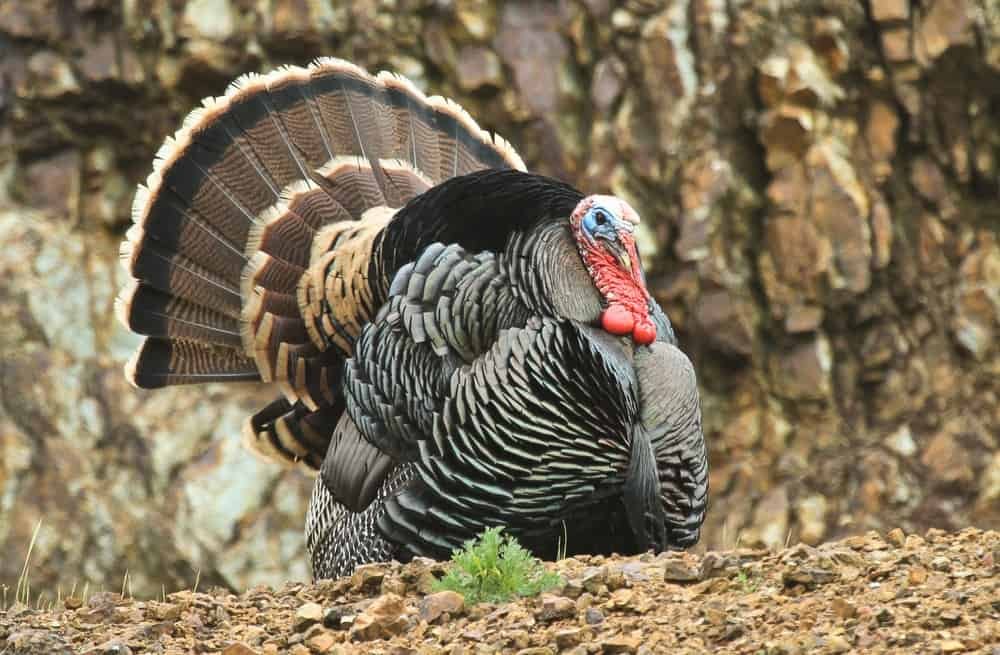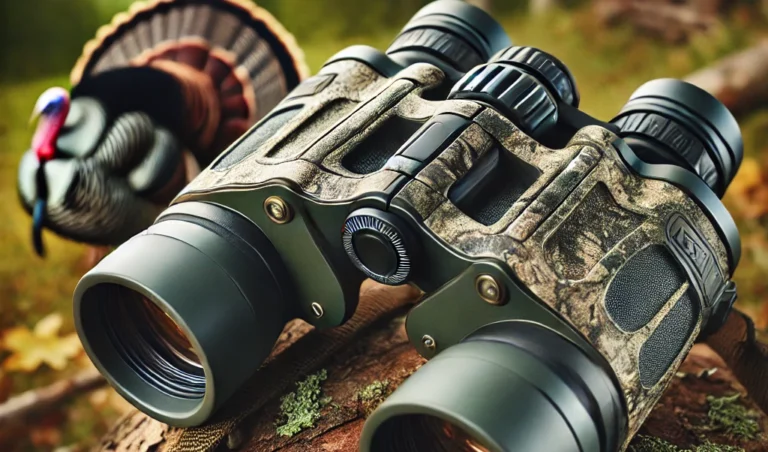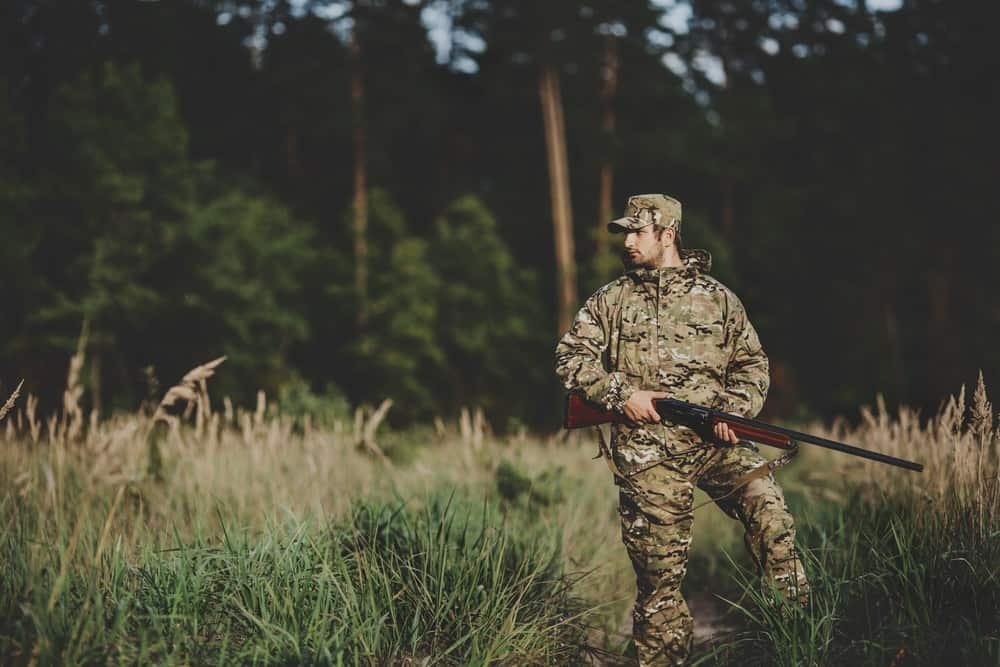Turkey Hunting in the Rain: 10 Expert Tips for Success
The pitter-patter of rain on your camo hat intensifies. Your shoulders are damp, and your boots are caked in mud. Most hunters would call it quits in bad weather, but not you. Because you know something they don’t – rainy days can be your secret weapon in the turkey woods. We will make you an expert on turkey hunting in the rain.
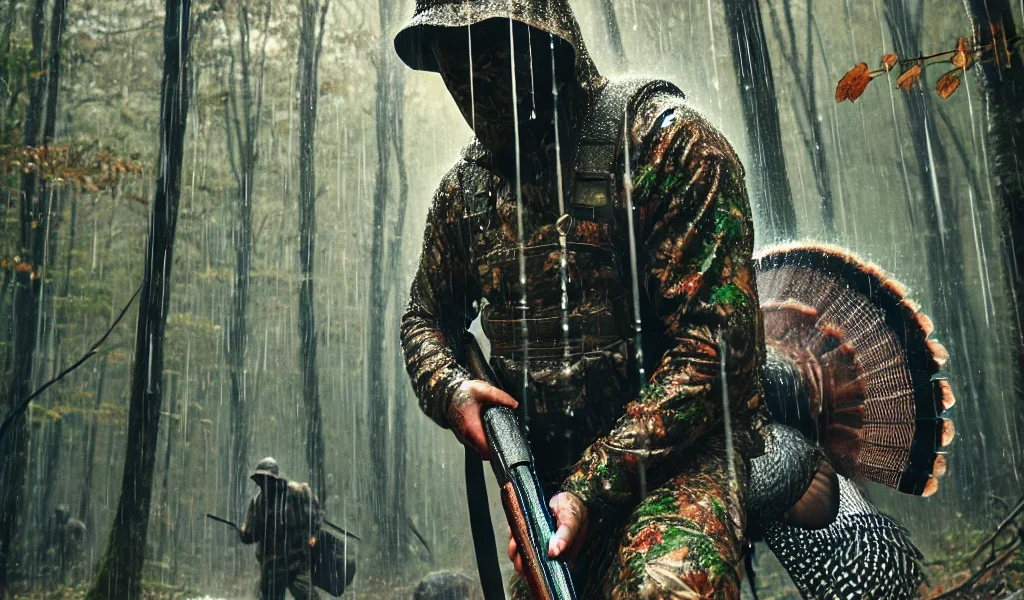
Welcome, fellow rain-soaked turkey enthusiasts! If you’ve ever found yourself questioning your sanity while sitting in a soggy blind, straining to hear a gobble over the drumming of raindrops, you’re in the right place. Turkey hunting in the rain isn’t just a test of endurance – it’s an opportunity to outsmart the weather and those wily gobblers.
Many hunters hang up their calls when the forecast turns wet, but that’s a rookie mistake. Rain changes the game, sure, but it also levels the playing field. With their keen eyesight somewhat dampened by the downpour, turkeys often become more vulnerable.
Their routines shift, their movements change, and suddenly, you’ve got an edge – if you know how to use it. Falling rain quiets the forest floor, making moving undetected and observing turkey behavior easier.
In this guide, we will dive deep into the puddles of wet weather turkey hunting. We’ll explore how rain affects turkey behavior and, more importantly, how to turn those rainy-day blues into a full game bag. We’ve got you covered, from gear tips that’ll keep you dry(ish) to calling techniques that cut through the noise of a spring shower.
So grab a cup of coffee, settle in, and get ready to learn why some of the best turkey hunting happens when the skies open up. Whether you’re a seasoned pro looking to up your rainy day game, or a newcomer wondering if it’s worth venturing out in a drizzle, these 10 expert tips will have you looking forward to those gloomy forecasts.
Let’s turn those rainy days into turkey-filled memories!
Understanding Turkey Behavior in the Rain
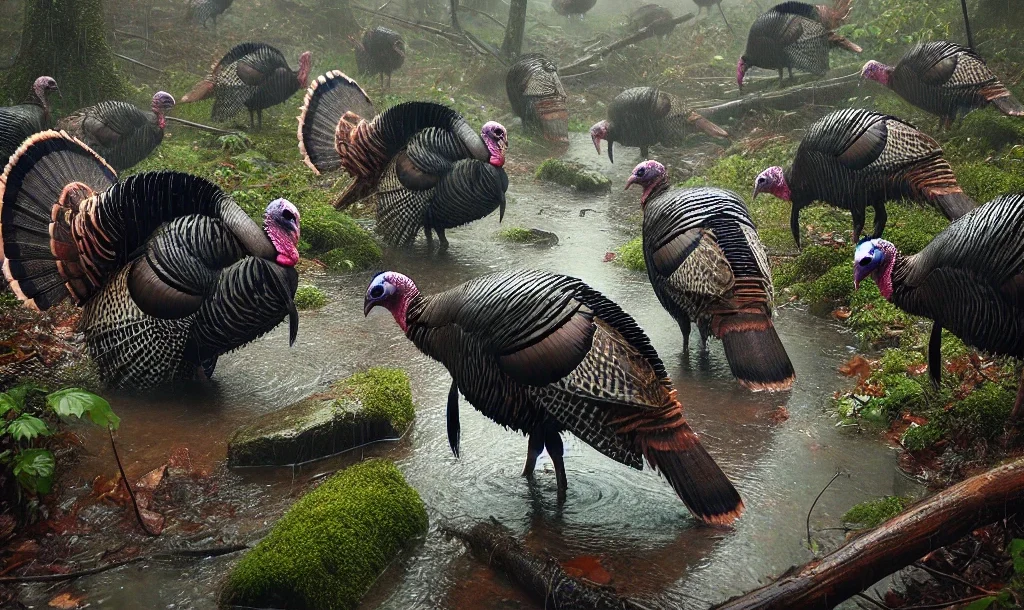
Before we discuss our expert tips, let’s discuss turkeys—specifically, how these birds behave when the sky starts spitting. Understanding these changes is key to successfully adapting your hunting strategy to hunt turkeys in the rain.
How Rain Affects Turkey Movement
Contrary to what you might think, turkeys don’t melt in the rain. They’re pretty well-equipped to handle wet weather. Their feathers have a natural oil that helps repel water, keeping them relatively dry even in a downpour. However, heavy rain can waterlog their feathers, making it harder for them to fly.
So, what does this mean for movement? In light rain, turkeys often continue their usual routines. But when it’s coming down, they tend to:
Seek shelter: Look for them under dense canopies, in pine stands, or near structures like old barns.
Move to open areas: Counterintuitively, they sometimes prefer open fields in heavy rain. The visibility helps them spot predators, and the rain noise masks the sounds of approaching threats, making it easier to locate birds.
Stick to high ground: Turkeys aren’t fond of standing water and often move to slightly elevated areas.
Changes in Feeding Patterns
Spring season can significantly impact where and how turkeys feed:
Increased foraging: Soft, wet ground makes it easier for turkeys to scratch for insects and worms. They often feed more actively in light rain.
Shift to open areas: Rain can make leaves and grass slippery, so turkeys may move to more open spots to feed, where walking is easier.
Timing changes: In persistent rain, turkeys might delay feeding until later when the rain lets up.
Impact on Gobbling and Other Vocalizations
Here’s where it gets interesting for us hunters. Rain can have a big effect on spring gobbler talk:
Reduced gobbling: In heavy rain, turkeys tend to gobble less. They’re less inclined to relinquish their position when they also can’t see or hear.
Increased calling later: As soon as the rain starts to let up, be ready. Turkeys often become more vocal, almost like they’re making up for lost time.
Softer calls: In light rain, turkeys might use softer calls to communicate. Your calling strategy will need to be adjusted accordingly.
More ground-level communication: With reduced visibility, turkeys rely more on close-range vocalizations and may concentrate more on clucks, purrs, and yelps rather than loud gobbles.
Understanding these behavioral changes is crucial. When you know how turkeys adapt to rainy conditions, you can adjust your tactics accordingly. In the coming tips, we’ll explore how to use this knowledge to your advantage, turning a rainy day into your most successful hunt.
Now that we’ve set the stage, let’s dive into our first expert tip for conquering turkey hunting in the rain. Trust me; you’ll want to pay close attention to this one – it could mean the difference between a soggy disappointment and a triumphant trek back to the truck with a big tom in tow.
10 Expert Tips for Wet Weather Turkey Hunting Success

Spring turkey hunting can be challenging, especially in wet weather conditions. Here are some expert tips to help you succeed in your turkey-hunting endeavors.
1. Gear Up Properly
Your first line of defense is your gear for rainy-day turkey hunting. Trust me, nothing ruins a hunt faster than being cold and soaked to the bone. Here’s how to stay dry and comfortable:
Waterproof Clothing Essentials
Rain Jacket: To tackle unpredictable spring weather, invest in a high-quality, breathable, and quiet rain jacket. Look for ones specifically designed for hunting with a camouflage pattern that matches your hunting area. Avoid bright colors or noisy materials that rustle with every movement.
Rain Pants or Chaps: Your legs need protection, too. Waterproof pants or chaps are crucial. Again, opt for quiet materials.
Waterproof Boots: Nothing’s worse than wet feet. Choose insulated, waterproof boots with good traction for those slippery conditions.
Gloves: Wet hands get cold fast. Bring waterproof gloves, but make sure they allow enough dexterity for operating your calls and weapon.
Hat: A wide-brimmed waterproof hat keeps rain off your face and out of your eyes. It also helps prevent water from running down the back of your neck.
Pro Tip: Layer up underneath your rain gear. Moisture-wicking base layers help manage sweat and keep you warm even if some moisture sneaks in.
Protecting Your Firearm or Bow
Your weapon needs as much protection from the elements as you do:
Gun Sock or Case: Use a waterproof gun sock or case when moving between locations. Some hunters swear by a simple trash bag in a pinch.
Scope Cover: Keep your scope clear with a removable waterproof cover.
Bow Cover: A bow cover or case is essential for bow hunters. It is especially important to keep your bowstring dry.
Barrel Protection: Gun hunters should consider placing electrical tape over the barrel to keep water out. Just remember to remove it before shooting!
Waterproofing Calls and Other Equipment
Call Protection: Store your calls in a waterproof case or plastic bag when not in use. A small mint tin works great for mouth calls.
Waterproof Bag: Bring a dry and waterproof backpack for extra gear, snacks, and electronics.
Lens Cloths: Pack plenty of microfiber cloths to wipe down optics, scope lenses, and binoculars.
Remember, staying dry isn’t just about comfort—extending your hunt. The longer you can stay out there comfortably, the better your chances of bagging that rainy-day gobbler.
A quick story: I once thought I could take a spring shower in my regular hunting jacket. Two hours later, I was heading back to the truck, cold and miserable, while my well-prepared buddy stuck it out and bagged a nice tom just after the rain let up. Learn from my mistake—gear upright, and you’ll have the turkey tale.
Next, we’ll discuss choosing the perfect setup for rainy-day hunting. Where you position yourself can make all the difference when the skies open up.
2. Choose Your Setup Wisely

When the rain is coming down, where you set up can make or break your hunt. The right location keeps you drier and puts you in the prime spot for intercepting rain-adjusted turkey movements. Here’s how to pick the perfect rainy-day setup:
Seeking Natural Shelter
Look for Natural Umbrellas: Large trees with dense canopies, especially pines or cedars, can provide excellent cover from the rain. These spots keep you drier and are likely turkey hangouts in wet weather.
Use Terrain Features: Rock outcroppings, small bluffs, or the leeward side of hills can offer protection from wind-driven rain. These areas can also create dry pockets that turkeys favor.
Consider Manmade Structures: If your hunting area includes old barns, abandoned sheds, or large equipment, these can provide excellent shelter for you and the turkeys.
Pro Tip: Always prioritize safety. Avoid setting up under lone trees or the tallest objects in an area during thunderstorms.
Best Locations for Rainy Day Hunts
- Field Edges: Turkeys often move to field edges during rain. The open area gives them better visibility, while the forest edge provides quick escape cover.
- Logging Roads and Trails: These areas make walking easier for turkeys in wet conditions and can serve as travel corridors.
- Food Plots: Rain often drives insects to the surface, making food plots especially attractive to hungry turkeys.
- Strut Zones: Don’t overlook known strut zones. Gobblers may visit these areas during breaks in the rain or as it tapers off.
The Importance of Higher Ground
- Avoid Low-lying Areas: Turkeys dislike standing water and mud. Focus on slightly elevated areas where water doesn’t pool.
- Ridge Tops and Benches: These areas drain well and can be preferred loafing spots for turkeys in wet weather.
- Subtle Elevation Changes: A slight rise in a field can make a difference. Turkeys will often gravitate to these drier spots.
Remember, your setup needs to balance concealment, comfort, and strategic positioning. I recall a rainy hunt where I set up on a small rise overlooking a field edge tucked under a big pine.
Not only did I stay relatively dry, but I could call in a group of hens with a trailing tom as they moved along the tree line, taking advantage of the slightly higher, drier ground.
One last thing – be prepared to be mobile. If your initial setup isn’t producing, don’t be afraid to make a move. Sometimes, finding the birds in the rain requires a bit of boot leather.
Next, we’ll discuss how to adjust your calling strategy for wet weather. When the rain’s drumming on the leaves, you need to know how to make your calls cut through the noise.
3. Master Wet Weather Calling Techniques
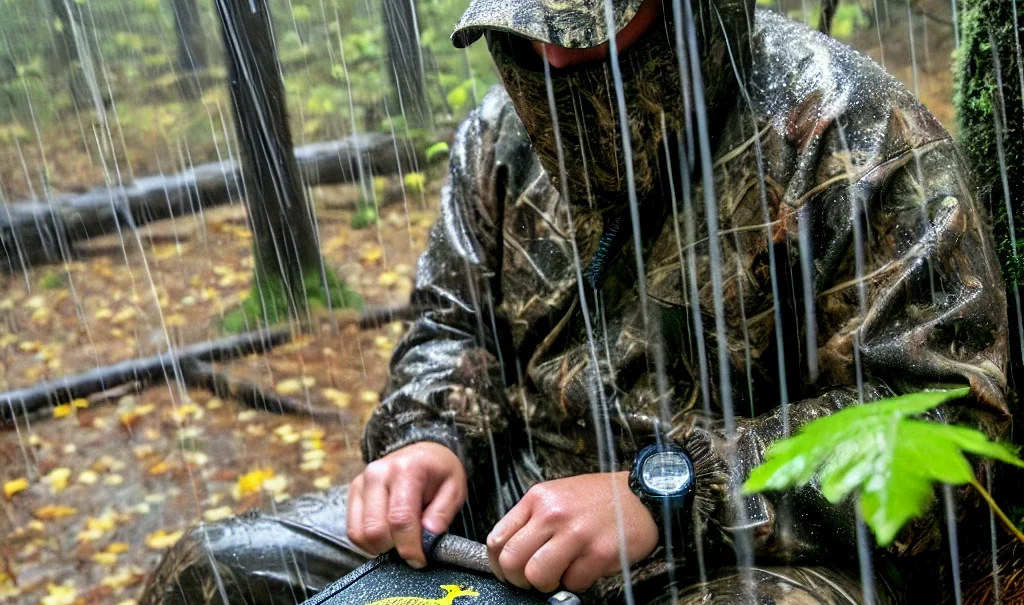
Your usual calling strategy might need some tweaking when the rain is pattering on the leaves. The key is to adapt your calls to cut through the ambient noise while mimicking how turkeys communicate in wet weather. Here’s how to make your calls heard and responded to:
Adjusting Call Volume and Frequency
- Amp Up the Volume: Rain creates a lot of background noise, so you’ll often need to call louder than usual. This is especially true for friction calls like box calls or slate calls.
- Increase Frequency: Call more often in the rain. Turkeys may have trouble pinpointing the source of the sound, so more frequent calling can help them home in on your location.
- Use Sharp, Crisp Calls: Opt for calls with higher pitches and sharper tones. These tend to cut through the sound of rainfall better than soft, subtle calls.
Pro Tip: Practice your loud calling before the season. You want to increase the volume without losing realism.
Best Calls for Rainy Conditions
- Box Calls: These are my go-to for rainy days. They’re loud and sharp, and the wood-on-wood action isn’t affected much by moisture.
- Slate Calls: Use a slate or glass call with a carbon striker. These materials perform well in damp conditions and produce high, clear notes.
- Mouth Calls: Diaphragm calls are great in the rain because they keep your hands free and dry. Plus, you can easily adjust volume and tone.
- Avoid Friction Calls: Pot calls with wooden strikers, or push-pin calls can be challenging in wet weather as the surfaces get slick.
Mimicking Rain-Specific Turkey Behavior
- Start Soft: Begin with some soft clucks and purrs. Turkeys often use these quieter calls in the rain to communicate with nearby birds.
- Transition to Yelps: Switch to Yelps as the rain lets up or during brief pauses. These are the bread-and-butter calls that hens use to regroup after seeking shelter.
- Use the “Wet Hen” Yelp: This is a slightly raspier, more urgent-sounding yelp that hens often make in rainy weather. It can be highly effective.
- Throw in Some Cutting: Sharp, loud cutting can grab a gobbler’s attention through the rain. Use this sparingly but assertively.
I remember one particularly wet morning when I was about to call it quits. The rain was steady, and I hadn’t heard a gobble all day. On a whim, I let out a series of loud, raspy yelps on my box call – much louder than I normally would.
To my surprise, I got an immediate gobble in response! Tom was much closer than I thought, but the rain had muffled his earlier responses. Twenty minutes later, he was flopping at 15 yards.
The lesson? Don’t be afraid to get loud and assertive with your calling on rainy days. Turkeys are still out there and are often more than willing to respond if they can hear you.
Next, we’ll talk about adjusting your decoy strategy for wet weather hunts. Because even in the rain, a well-placed fake can make all the difference.
4. Enhance Your Decoy Strategy
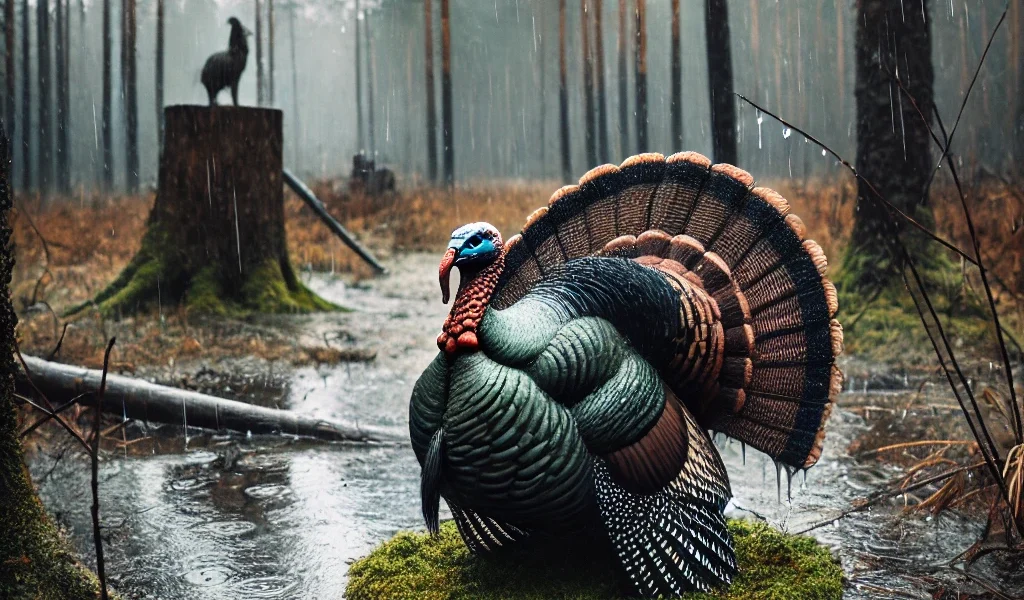
Even in the rain, visual cues can be a powerful attractant for turkeys. However, wet conditions present unique challenges and opportunities for decoy use. Here’s how to make your fakes work overtime in the rain:
Making Decoys More Visible in Low Light
- Use Brighter Decoys: Opt for decoys with brighter, more visible paint jobs. Subtle, ultra-realistic coloration might be a disadvantage in low light and rainy conditions.
- Add Flash: Consider adding reflective tape or bright paint to small areas of your decoy, like the head or tail. This can catch what little light there is and draw attention.
- Position for Visibility: Place decoys in slightly more open areas than you might on a clear day. This increases the chances of turkeys spotting them from a distance.
Pro Tip: A jake decoy with a bright red head can be eye-catching in dreary conditions.
Decoy Placement in Wet Conditions
- Elevate Your Decoys: Place your decoys on small rises or mounds to keep them out of puddles and make them more visible.
- Face Decoys Downwind: Turkeys often face downwind in the rain to keep water out of their faces. Position your decoys accordingly for added realism.
- Create Movement: Wet feathers are heavy, so turkeys move less in the rain. A motion decoy can stand out and attract attention in these conditions.
Using Motion Decoys Effectively
- Spinning Wing Decoys: These can be highly effective in the rain. Their movement catches the eye even in low-visibility conditions.
- Bobbing Head Decoys: A jake or hen decoy with a bobbing head can create lifelike, visible motion even through rainfall.
- DIY Motion: If you don’t have a mechanical motion decoy, try attaching a turkey wing to a long, thin rod. Subtle movements from your hiding spot can create realistic wing flapping or preening motions.
I once had a memorable rainy-day hunt in which I used a bright white hen decoy (which I normally avoid as too visible) along with a jake decoy with a bright red head. I positioned them on a small rise on a field edge.
Despite the steady drizzle, three jakes spotted that setup from over 100 yards away and came in on a string. The contrast of the white hen against the gloomy backdrop seemed to grab their attention.
Remember, in the rain, turkeys are often looking for company. They may be more willing to approach decoys, seeking the safety of a group. Don’t be afraid to use multiple decoys – a small flock setup can be very attractive in wet weather.
One last tip: Always carry a small towel or rag to wipe down your decoys periodically. Water droplets can create unnatural shine, and keeping your decoys dry(ish) helps maintain their effectiveness.
Next, we’ll discuss adapting your movement and stealth tactics for wet conditions. While the rain might mask some of your sounds, it presents challenges for staying undetected.
5. Adapt Your Movement and Stealth Tactics
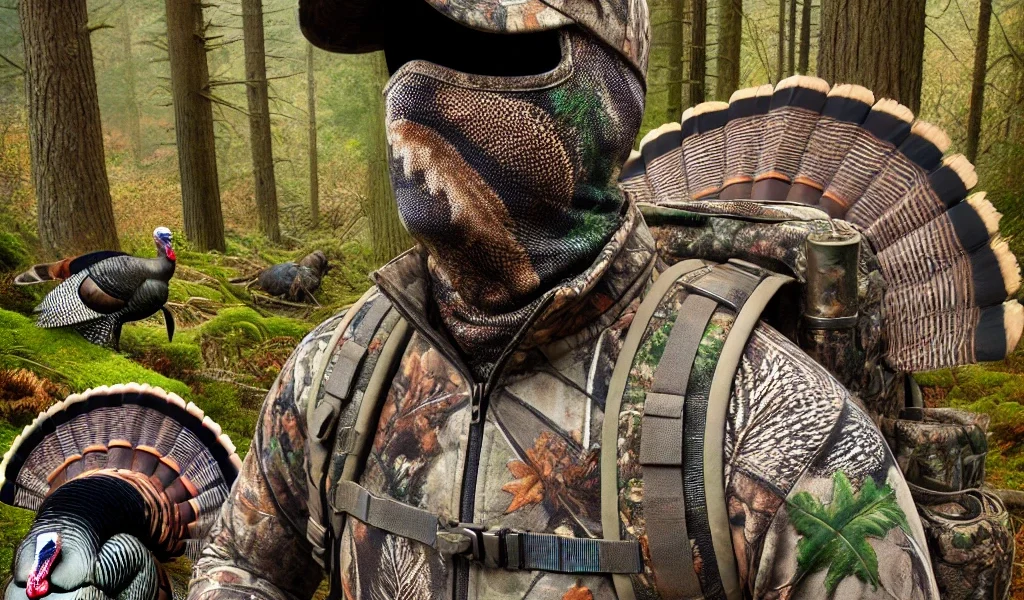
Rainy conditions can be a double-edged sword when it comes to stealth. While the sound of rain can mask some of your movements, wet gear and slippery conditions present their challenges. Here’s how to stay ghost-like even when you’re soaked:
Using Rain Noise to Your Advantage
- Time Your Movements: Make your bigger movements during heavier bursts of rain. The increased noise will help cover any sounds you make.
- Rain Rhythm: Try to move in sync with wind gusts or harder rain patterns. Turkeys are less likely to notice movement that matches natural rhythms.
- Pause During Lulls: When the rain eases up, freeze. These moments of relative quiet are when turkeys are most alert to unusual sounds.
Pro Tip: Learn to distinguish between the sound of rain hitting leaves and the sound of footsteps. Turkeys know the difference, and you should, too.
Adjusting Your Pace and Stalking Techniques
- Slow and Steady: Move even slower than usual. Wet leaves and branches are more likely to make noise when disturbed.
- Watch Your Step: Avoid stepping on sticks or dry leaves, which can snap or crunch even when wet. When possible, aim for bare earth or rocks.
- The Turkey Shuffle: Take a slow, sliding step that minimizes foot lifting, reducing the chance of a noisy misstep.
- Use Natural Cover: Take advantage of rain-heavy branches or bushes. They provide extra visual cover, and the water movement helps conceal your own.
Being Mindful of Mud and Slippery Surfaces
- Check Your Boots: Regularly clear mud from your boot treads. Built-up mud can make you slip or leave obvious tracks.
- Avoid Slick Surfaces: Wet logs, rocks, and leaves can be treacherously slippery. One fall can ruin your hunt and potentially be dangerous.
- Plan Your Route: Before moving, scan and plan a path that avoids the noisiest or most slippery obstacles.
I remember a rainy day hunt where I spotted a tom about 80 yards out, but he was moving away. The steady rain allowed me to close the distance faster than I normally could.
I could halve the distance without being detected by timing my movements with gusts of wind and heavier rain. When I finally set up and called, Tom turned on a dime and came right in.
One last piece of advice: Practice your rainy-day moves before the season begins. Spend some time in wet weather, working on silent movement techniques. The more comfortable you move in the rain, the more effective you’ll be when it counts.
Next, we’ll discuss optimizing your vision in rainy, low-light conditions. Spotting that distant tom through the mist can make all the difference.
6. Optimize Your Vision
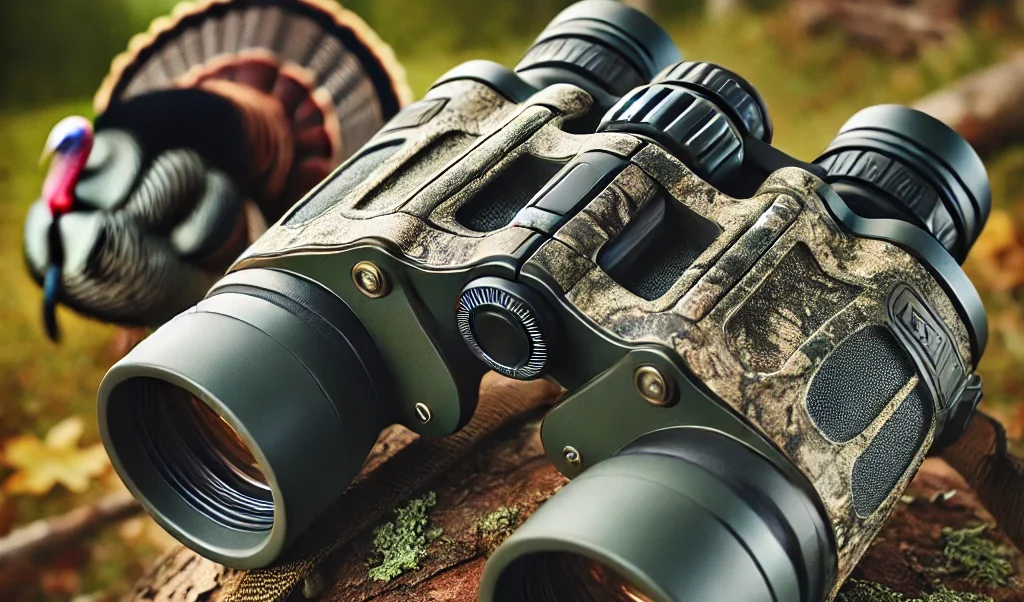
Rainy conditions can significantly reduce visibility, challenging spotting turkeys or reading their subtle movements. Here’s how to give your eyes the edge in wet weather:
Dealing with Fogged Optics
- Anti-Fog Solutions: Apply the anti-fog solution to your glasses, scope, or binocular lenses before the hunt and reapply as needed throughout the day.
- Proper Ventilation: Ensure your hunting mask or face covering doesn’t direct your breath upward onto your glasses or optics.
- Quick Fixes: Carry a microfiber cloth to wipe away fog or water droplets quickly. A light saliva coating in a pinch can prevent fogging (old scuba diver trick!).
Pro Tip: If you wear glasses, consider contacts for rainy hunts. They’re less prone to fogging and won’t collect raindrops.
Enhancing Visibility in Low Light Conditions
- Quality Optics: Invest in high-quality, multi-coated lenses for your binoculars and scope. They gather more light, which is crucial on dim, rainy days.
- Tinted Lenses: Yellow or amber-tinted shooting glasses can enhance contrast in low-light conditions, making it easier to spot movement.
- Use the Right Power: Lower-power optics often work better in the rain. They have a wider field of view and gather more light than high-power lenses.
Reading Subtle Turkey Movements in the Rain
- Focus on Open Areas: In the rain, turkeys often prefer open spaces where they can see better. Train your eyes on field edges and clearings.
- Watch for Water Movement: Look for unusual ripples in puddles or wet areas. This can indicate turkey movement even when you can’t see the birds directly.
- Silhouettes and Shapes: In misty conditions, look for turkey-shaped silhouettes rather than trying to spot specific features.
- Use Peripherals: Your peripheral vision is more sensitive to movement. Scan slowly and pay attention to anything that catches the corner of your eye.
I once had a memorable hunt on a misty, drizzly morning. Visibility was poor, and I was about ready to call it quits. But I decided to glass one last field edge with my binoculars.
I couldn’t identify the details but spotted an unusual dark shape moving along the tree line. It was a group of three hens with a trailing tom. Without taking that last look at quality optics, I would have missed my opportunity.
Remember, turkeys don’t stop moving just because it’s raining. They’re still out there, and with the right techniques, you can spot them even in challenging conditions.
One last tip: Consider using a small, collapsible umbrella attached to a tree or your blind. It can keep rain off your face and optics, dramatically improving your ability to see clearly without compromising your concealment.
Next, we’ll discuss extending your hunting hours in rainy conditions. Because sometimes, the key to success is simply outlasting the competition.
7. Extend Your Hunting Hours

Why Turkeys May Be More Active Later in the Day
- Delayed Feeding: Rain often postpones regular feeding times. Turkeys may be more active later in the day to make up for lost foraging time.
- Reduced Predator Activity: Many predators are less active in the rain, which can make turkeys feel safer moving about later than usual.
- Temperature Changes: As rain lets up, especially in the afternoon, rising temperatures can spur turkey activity.
Pro Tip: Don’t give up if you haven’t heard gobbling by mid-morning. In rainy conditions, turkeys often become more vocal as the day progresses.
Taking Advantage of Breaks in the Rain
- Stay Alert: Be ready for increased turkey activity during lulls in the rain. These periods often see a flurry of movement and calling.
- Repositioning: Use breaks in the weather to reposition yourself. Turkeys are likely doing the same, so be prepared to adapt your setup.
- Calling Strategy: Increase your calling during rain breaks. Turkeys may be more responsive as they regroup and communicate with each other.
Safety Considerations for Longer Hunts
- Stay Hydrated: It’s easy to forget to drink water in cool, wet conditions. Bring plenty of water and stay hydrated throughout the day.
- Extra Layers: Pack additional dry layers. Changing into dry clothes at midday can help you stay comfortable and extend your hunt.
- Inform Others: Let someone know your plans to stay out longer than usual. Safety should always be your top priority.
- Watch for Hypothermia: Be aware of the signs of hypothermia, especially if temperatures are cool. Shivering, confusion, and loss of coordination are red flags.
I recall a rainy spring hunt where patience paid off. The morning was a washout, with heavy rain and no turkey activity. But I stuck it out, staying dry in my ground blind. Around 2 PM, the rain slacked off to a drizzle. Suddenly, the woods came alive with yelps and gobbles.
By staying put and extending my hunt, I was in the perfect position when the turkeys decided to get active. I bagged a nice tom at 4 PM – when I would normally have been heading home on a clear day.
Remember, outlasting other hunters can be a strategy in itself. Many will call it quits early on a rainy day, leaving you with less competition and more opportunity as conditions improve.
One last piece of advice: Bring entertainment for the slow periods. A good book, a fully charged phone, or even some quiet game apps can help pass the time during long lulls. Just stay alert and ready to act when turkey activity picks up.
8. Focus on Food Sources

Rainy weather can significantly impact where and how turkeys feed. Understanding these changes can put you in prime position for a successful hunt. Here’s what you need to know:
Understanding How Rain Affects Turkey Feeding Habits
- Increased Earthworm Activity: Rain often brings earthworms to the surface, providing an easy protein source for turkeys.
- Softer Ground: Wet conditions make it easier for turkeys to scratch and forage in the soil.
- Shift in Insect Behavior: Many insects become more active or visible during damp conditions, attracting hungry turkeys.
Pro Tip: Look for areas with lots of leaves or forest duff after rain. Turkeys love to scratch through these for insects and seeds softened by the moisture.
Identifying Prime Feeding Areas in Wet Conditions
- Field Edges: The interface between woods and fields often harbors a mix of cover and food sources, especially after rain.
- Recently Logged Areas: These spots often have disturbed soil and new growth, both attractive to foraging turkeys in wet weather.
- Cattle Pastures: If your hunting area includes pastures, check them out. Cow patties attract insects, which in turn attract turkeys.
- Mast-Producing Trees: Areas under oak or beech trees can be hotspots, as rain can make old acorns or beechnuts more accessible.
Setting Up Near Food Sources
- Use Natural Blinds: Set up in brushy areas or against large trees near these feeding zones for concealment.
- Play the Wind: Position yourself downwind of likely feeding areas. Wet turkeys rely more on their sense of smell.
- Be Patient. Turkeys may linger longer at food sources during rainy weather, so be prepared to wait them out.
I remember a particularly wet season a few years back. I struggled to pattern the birds until I noticed something: after every rain, a group of hens would appear in a small, recently cleared area near the edge of my hunting property.
The exposed soil there was teeming with worms and grubs. I set up nearby one drizzly morning, and sure enough, the hens showed up – followed by a nice tom who couldn’t resist joining the buffet.
One more piece of advice: Don’t neglect man-made food sources. If your area has agricultural fields, particularly those with waste grain or newly sprouted crops, these can be magnets for turkeys in wet weather.
Remember, a turkey’s got to eat, rain or shine. If you can figure out where they’re getting their meals in wet weather, you’re well on your way to a successful rainy-day hunt.
9. Be Patient and Persistent
Rainy day turkey hunting can test your resolve, but often, the hunter stays in the game the longest and comes out on top. Here’s how to cultivate the patience and persistence needed for success:
The Importance of Sitting Longer in Rainy Conditions
- Outlast Other Hunters: Many hunters call it quits early on rainy days. By staying out longer, you increase your odds of being in the right place when turkeys become active.
- Wait Out the Weather: Turkeys become more active as rain lets up. Being there when conditions improve can lead to exciting opportunities.
- Give Calls Time to Work: Sound doesn’t travel as well in the rain. Give your calls more time to reach and attract distant birds.
Pro Tip: Set small goals for yourself. Tell yourself you’ll stay for “30 more minutes” and repeat this. Often, success comes just when you’re about to give up.
Strategies for Staying Comfortable During Extended Waits
- Proper Layering: Start with moisture-wicking base layers and add insulating layers as needed. Being comfortable is key to staying patient.
- Stay Dry: Wear a quality rain suit and consider a waterproof seat or cushion. Being wet can lead to cold, which can send you home early.
- Bring Snacks: Pack high-energy, quiet snacks. Staying fueled helps maintain focus and warmth.
- Stay Hydrated: Drink water regularly, even if you don’t feel thirsty. Dehydration can affect your alertness and decision-making.
Mental Preparation for Wet Weather Hunts
- Set Realistic Expectations. Understand that rainy-day hunts can be slower. Adjust your expectations and celebrate small victories.
- Practice Mindfulness: Use the quiet time to tune into your surroundings. Listen to the rain and observe nature. This can turn waiting into a rewarding experience.
- Visualize Success: Spend time imagining a successful encounter. This mental rehearsal can help you stay focused and ready.
- Learn from Each Hunt: Even if you don’t bag a bird, treat each rainy day hunt as a learning experience. What did the turkeys do? How can you adjust next time?
I’ll never forget a rainy hunt a few seasons back. I’d been sitting for hours with no action, cold and questioning my sanity. Just as I was about to stand up and call it a day, I heard a faint gobble.
Thirty minutes later, a mature tom stepped into view after some soft calling. Had I given up just a few minutes earlier, I would have missed out on one of my most memorable hunts.
One last piece of advice: Bring a buddy if you can. Having someone to chat with quietly during slow periods can make the wait more enjoyable and help you stay longer in the woods.
Remember, turkey hunting in the rain is often a game of attrition. The hunter who can stay out there, stay comfortable, and stay focused will ultimately find success.
Next, we’ll wrap up our final tip on practicing safe shooting in wet conditions. Because when that long-awaited opportunity finally arrives, you want to be ready to make it count.
10. Practice Safe Shooting in Wet Conditions
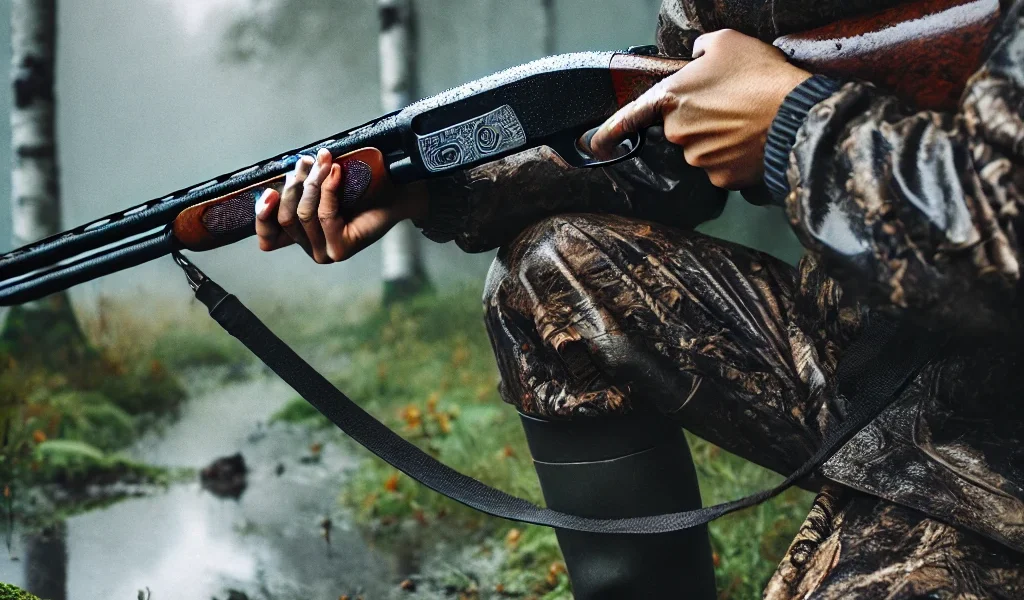
When that long-awaited opportunity finally arrives, you must be ready to make your shot count, regardless of the weather. Shooting in the rain presents unique challenges, but you can still be effective and ethical with the right preparation and technique. Here’s how:
Adjusting for Reduced Visibility
- Use a Scope Cover: Keep a flip-up scope cover on until you’re ready to shoot. This keeps your optics clear of water droplets.
- Choose a Red Dot Sight: In rainy conditions, a quality red dot sight can be easier to use than traditional iron sights or some scopes.
- Identify Your Target Clearly: Never shoot at sound or movement alone. In low visibility, it’s crucial to clearly identify your target before taking the shot.
Pro Tip:Practice shooting with fogged glasses or through a water-streaked sight picture before the season. This will help you adapt quickly in the field.
Maintaining Proper Form with Wet Gear
- Adjust Your Grip: Wet conditions can make your firearm slippery. Ensure you have a firm, consistent grip before taking your shot.
- Use Textured Gloves: Consider gloves with a textured palm and fingers for better grip in wet conditions.
- Check Your Stance: Wet ground can be slippery. Ensure your footing is solid before shouldering your weapon.
- Wipe Down Your Firearm: Keep a small, absorbent cloth handy to quickly wipe your gun before shooting.
Ensuring Ethical and Clean Shots
- Know Your Effective Range: Reduce your maximum shooting distance in the rain. Shooting beyond your effective range in poor visibility can wound birds.
- Aim for Vital Areas: In wet conditions, turkeys’ feathers can be matted down, slightly changing their appearance. Focus on aiming for the head and neck area.
- Follow Through: After the shot, keep your eye on the bird. Wet turkeys can be surprisingly tough, and you must be prepared for a quick follow-up shot if necessary.
- Check Your Barrel: Before shooting, ensure your barrel is free of any obstructions, including water. A barrel full of water can be dangerous when fired.
I remember a rainy day hunt where I had a tom come in silent, barely visible through the mist. I almost missed my opportunity because of water on my scope. Since then, I’ve kept a small microfiber cloth in my vest for a quick lens wipe-down. It’s saved more than one hunt since.
One last crucial piece of advice: Always prioritize safety over taking a shot. Let it pass if you’re not 100% confident in your target identification or your ability to make a clean shot. There will be other opportunities, and ethical hunting should always come first.
Conclusion
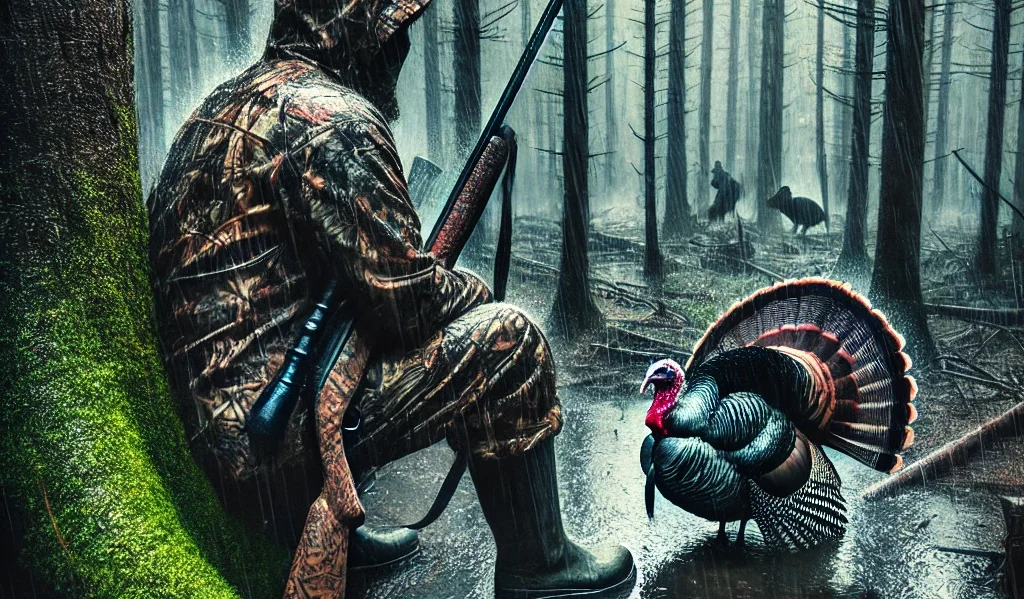
And there you have it, folks – ten expert tips to turn a rainy-day turkey hunt from a washout into a success story. We’ve covered all the bases, from gearing up properly to mastering wet weather calling, choosing the right setup, and making that crucial shot.
Remember, hunting in the rain isn’t just about enduring the elements – it’s about embracing the unique opportunities that wet weather provides. Fewer hunters in the woods, changes in turkey behavior, and the chance to test your skills against the elements all make for memorable hunts.
So, don’t hang up your vest next time the forecast looks gloomy. Gear up, get out there, and put these tips to the test. You might find that some of your best turkey hunting memories happen on the days when others stay home.
Happy hunting, and stay dry out there!

